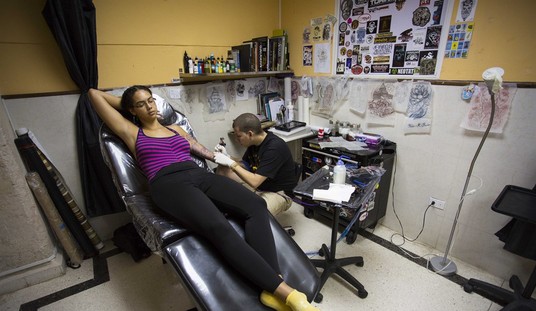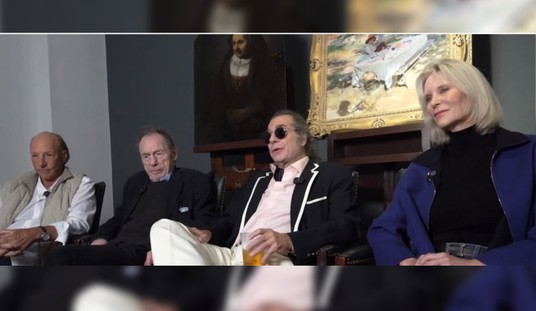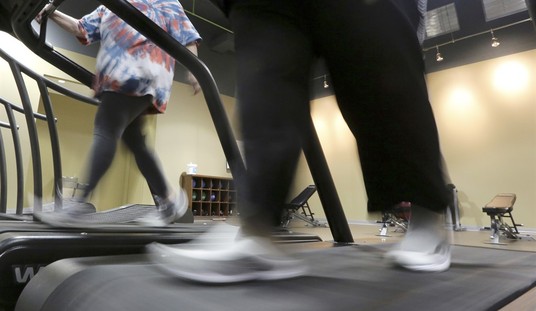Given the extraordinary sudden turnabout in US policy toward Israel under the Obama Administration, I have become obsessed by the repressed 2003 videotape of Rashid Khalidi and Barack Obama. That tape — or so we are told — is ensconced in a safe at the Los Angeles Times building. In the current situation, its release by the paper is more important and newsworthy than ever.
The Khalidi tape could be of tremendous significance in revealing the provenance of Obama’s views on the Middle East and the degree to which the public was misled on those views during the presidential campaign.
I am writing to solicit the help and ideas of Pajamas Media readers for seeking the release of the tape to the public. But first a little background, if your memories are as foggy as mine can be.
Rashid Khalidi — a Palestinian-American historian known for his strong pro-Palestinian opinions — is currently the Edward Said Professor of Modern Arab Studies at Columbia and director of that university’s Middle East Institute. After Khalidi received this Columbia appointment in 2003, a farewell dinner party was held in his honor in Chicago. A videotape was made of that party where many good things were said about the Palestinian cause and many bad things about Israel. Then Illinois state Sen. Barack Obama was in attendance, as were, some say, William Ayers and Bernadine Dohrn.
That tape, as Leon DeWinter reminded us, was given at some point by an unknown person to Peter Wallsten of the Los Angeles Times. Wallsten then reported on some of its contents in a brief LAT article of April 10, 2008 titled “Allies of Palestinians see a friend in Obama.”
Perhaps because it was so attenuated, that article engendered a cry for the release of the full tape. What really happened at the party? What was said? How did Obama react? People wanted to know more details of the Middle East views of the presidential candidate. But the LAT was effectively mum and sequestered the tape in its safe.
In response to a charge of suppression of information by the McCain campaign, the paper’s editor Russ Stanton said:
“The Los Angeles Times did not publish the videotape because it was provided to us by a confidential source who did so on the condition that we not release it. The Times keeps its promises to sources.”
Was this an oral promise made by the paper or by the reporter? Or was there a written agreement, as would be more proper and normal in such circumstances? The Times has not told us, nor have they produced a written agreement of any sort, even without the source’s name. We don’t know either whether a transcription is proscribed.
They have told us almost nothing. We have to take this all on faith, just as we do this risible comment by the paper’s ‘readers’ representative’ Jamie Gold, quoted in the same article with Stanton:
“More than six months ago the Los Angeles Times published a detailed account of the events shown on the videotape. The Times is not suppressing anything. Just the opposite — the L.A. Times brought the matter to light.”
Detailed? Brought the matter to light? I am tempted to use the tired Internet acronym ROFLOL. But let’s examine Wellsten’s original article instead. It begins:
It was a celebration of Palestinian culture — a night of music, dancing and a dash of politics. Local Arab Americans were bidding farewell to Rashid Khalidi, an internationally known scholar, critic of Israel and advocate for Palestinian rights, who was leaving town for a job in New York.
A special tribute came from Khalidi’s friend and frequent dinner companion, the young state Sen. Barack Obama. Speaking to the crowd, Obama reminisced about meals prepared by Khalidi’s wife, Mona, and conversations that had challenged his thinking.
His many talks with the Khalidis, Obama said, had been “consistent reminders to me of my own blind spots and my own biases. . . . It’s for that reason that I’m hoping that, for many years to come, we continue that conversation — a conversation that is necessary not just around Mona and Rashid’s dinner table,” but around “this entire world.”
And? Well, that’s about it. Wellsten doesn’t tell us much more from the videotape or the party other than:
“a young Palestinian American recited a poem accusing the Israeli government of terrorism in its treatment of Palestinians and sharply criticizing U.S. support of Israel. If Palestinians cannot secure their own land, she said, “then you will never see a day of peace.”
One speaker likened “Zionist settlers on the West Bank” to Osama bin Laden, saying both had been “blinded by ideology.”
That’s it. No word of the details of how Obama reacted or what he really said, other than the short quote above.
Interestingly, that sole Obama remark, as reported by Wallsten, contains an ellipsis in the middle. After the then-state senator says the Khalidis had given him “consistent reminders to me of my own blind spots and my own biases” comes a strategically placed dot-dot-dot. We don’t know what those blind spots and and biases were and what he might have thought of them. Or how he might have changed. That, in Wallsten’s or some Times editors’ judgement, was best left on the tape.
So what are we to think? We have an administration that not only ascribes most of the Middle East blame to Israel, but also has banned “Islamism” and all related words, even “Islam” and “jihad” from our national security documents. They’re completely gone. Indeed, even the Fort Hood massacre, so clearly inspired by Islamic extremism, has now been shifted into the comfortable category of the lone, angry killer. Rashid Khalidi should be happy. And, in fact, he is.
Sometimes I want to yell and scream. What is wrong with the Los Angeles Times? Are they a news organization or the propaganda wing of some leftover unit of the IWW? No wonder subscribers are deserting them in droves.
But I won’t yell and scream. I want to be polite. I have old friends at the Times. And what I seek is the release of the tape. Even if there is a legitimate promise to the source, the public interest now overwhelms this. Few stopped to criticize when the Pentagon Papers were published by the New York Times. And they were stolen from the Department of Defense. Let’s get this done. If the tape exonerates Obama, they should be anxious to publish it. If it doesn’t, the Times has done a public service. That’s their job.
But failing that, I turn to you, dear reader. What is to be done? We can’t send a FOIA request to the Los Angeles Times. They’re a private company — or owned by one. There must be other means.
One way is to go to the original reporter Mr. Wallsten. He now works for the Wall Street Journal. I have put in a call to him. We shall see how, or if, he replies. Another way is to find and contact the person who gave Wellsten the tape. Deborah Schlussel believes that person is Ali Abunimah of the Electronic Intifada and Arab American Action Network, an organization founded by the Khalidis. I don’t know if that is true, although I can speculate on the motives.
Whatever the case, the time to reveal the tape is now. Please make your suggestions for what to do. It will be an interesting experiment in citizen journalism to try to do it together. And, unlike the current administration, to do it transparently.








Join the conversation as a VIP Member